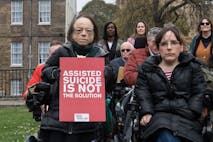
Full term 'miracle' baby born after 'unprecedented' ectopic pregnancy
Bridget Sielicki
·
‘Aid in dying’ is suicide, no matter how much its advocates try to redefine it
Last month, news broke that Connecticut lawmakers are planning to introduce another assisted suicide bill, calling it a “priority.” Even though a similar bill previously failed in 2013 and disability groups continue to oppose assisted suicide, it seems the bill will move forward anyway — and assisted suicide advocacy groups are already mobilizing.
In an op-ed for the Connecticut Mirror, lawyer David Leven argued that assisted suicide is not only necessary but somehow different from “regular” suicide. His letter was written in response to disability activist Lisa Blumberg, who pointed out the numerous problems surrounding assisted suicide. Yet Leven’s response was to simply further obscure the issue by using deceptive pro-assisted suicide rhetoric. This should come as no surprise, as Leven was the Executive Director of End of Life Choices New York (EOLCNY) from 2002 until 2016, and still serves as a senior consultant, indicating an obvious bias.
A shocking ignorance of suicide
Leven begins by trying to distinguish between so-called “aid in dying” and suicide, as if the two are completely different. “Terminally ill patients who consume life ending medicines are not suicidal. Stark differences exist,” he wrote. “Suicides are committed by those who can continue to live, but choose not to; are done in isolation, often impulsively and violently; and they are tragic. To the contrary, medical aid in dying is available only to terminally ill patients who will soon die; the process usually takes at least several weeks; it occurs after consultation with two physicians and almost always with family support; and it is empowering.”
To begin with, Leven displays a shocking ignorance of suicide itself, blithely shrugging it off as a lonely, violent, impulsive act by people who simply choose not to live anymore. None of these things are true; an estimated 90% of people who commit suicide show symptoms of a mental health condition and may not freely or rationally be making the choice to die. Furthermore, it’s hardly an impulsive, isolated act. A suicidal person makes approximately 25 suicide attempts before he or she is ultimately successful at taking their own life. People who are suicidal also frequently display warning signs and red flags, which should be seen as cries for help.
READ: Shock claim: Assisted suicide is needed so women won’t have ‘burden’ of caring for the sick
People don’t feel “empowered” by assisted suicide
And while Leven tries to frame the act of taking one’s life as “empowering,” this couldn’t be further from the truth. Data from Oregon has found that people most often cite a “loss of autonomy” as their reason for wanting to die, not because they’re dying from a painful, terminal illness. Multiple other studies in well-respected medical journals have found that people seek assisted suicide because they are hopeless, afraid of being a burden, have little to no support, and are depressed — the same reasons healthy people attempt to kill themselves.
Leven somewhat acknowledges this, but then brushes it aside, essentially arguing that it doesn’t matter. “[T]he concern expressed about why people choose medical aid in dying, which is not usually because of uncontrollable pain, is not valid,” he wrote. “People suffer in different ways at the end of their lives. All who are dying and have decision-making capacity should be able to decide if and when, if ever, that their suffering has become intolerable, whether because of pain or other reasons.”
Article continues below
Dear Reader,
Have you ever wanted to share the miracle of human development with little ones? Live Action is proud to present the "Baby Olivia" board book, which presents the content of Live Action's "Baby Olivia" fetal development video in a fun, new format. It's perfect for helping little minds understand the complex and beautiful process of human development in the womb.
Receive our brand new Baby Olivia board book when you give a one-time gift of $30 or more (or begin a new monthly gift of $15 or more).
So his argument boils down to the notion that emotional health should be treated the same as physical health, and if someone is “suffering” emotionally and wants to die faster, who are we to stop them?
The real issue: Perception of worth
While he tries to hide it, Leven fails to to obscure the reality of the assisted suicide movement: that only some lives are deemed as worth protecting from suicidal impulses. The suicide attempts of people who are young and healthy are rightly seen as in need of intervention, their suicide attempts stopped at all costs.
But people with so-called “terminal illnesses” are treated as if their lives are no longer worth saving, even though having a terminal illness doesn’t mean death is necessarily imminent. A terminal illness a disease which cannot be cured, and will cause the death of the patient eventually. Cystic fibrosis (CF), for example, is considered to be a terminal illness, even though people with it can now live into their 30s. So would someone with CF be eligible for assisted suicide? Is their life worth saving, or are they a lost cause because they’re lost and disabled? Leven makes it clear what his stance is, and this mindset of only some lives being worth saving is exactly what needs to change.
READ: Abortion and assisted suicide are two sides of the same coin, and both need to end
In an interview with the Hartford Courtant, Cathy Ludlum — a disability activist and leader of Second Thoughts Connecticut — summed up exactly why this is so dangerous, particularly for the most vulnerable people in society.
“No amount of safeguards can counter the social stigma of needing help with intimate care, of having to rely on others for support, of seeing your caregivers are tired, and wondering whether the world would be better off without you,” she said, and in a press release, added, “If assisted suicide passes, it will forever change the way healthcare is provided. At a time when we are already concerned about disparities in healthcare, it will adversely affect people’s lives, especially those of us who are already societally devalued.”
“Like” Live Action News on Facebook for more pro-life news and commentary!
Live Action News is pro-life news and commentary from a pro-life perspective.
Contact editor@liveaction.org for questions, corrections, or if you are seeking permission to reprint any Live Action News content.
Guest Articles: To submit a guest article to Live Action News, email editor@liveaction.org with an attached Word document of 800-1000 words. Please also attach any photos relevant to your submission if applicable. If your submission is accepted for publication, you will be notified within three weeks. Guest articles are not compensated (see our Open License Agreement). Thank you for your interest in Live Action News!

Bridget Sielicki
·
Analysis
Angeline Tan
·
Analysis
Cassy Cooke
·
Politics
Madison Evans
·
Opinion
Nancy Flanders
·
Investigative
Carole Novielli
·
Analysis
Cassy Cooke
·
International
Cassy Cooke
·
International
Cassy Cooke
·
Politics
Cassy Cooke
·
Pop Culture
Cassy Cooke
·